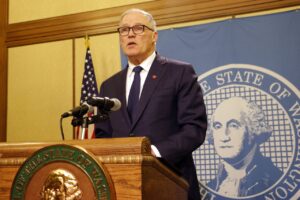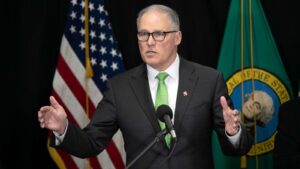Senate’s $52.3 billion budget proposal includes tax cuts for North Carolinians
4 min read
North Carolina Senate Republicans have proposed a biennium budget that includes a sweeping tax cut for North Carolinians and a 10-year, $12 billion cash infrastructure and capital plan.
State economists predict North Carolina will collect $60.4 billion in revenue over the next two years. Senate Republicans want to spend a total of $52.3 billion on infrastructure, bonuses and raises for state employees, education and other public services and state agencies. One of their top priorities, however, is returning the budget surplus to taxpayers.
“A decade of responsible budgets and growth-oriented tax policy has North Carolina in the best fiscal shape in a generation,” said Senate Leader Phil Berger, R-Rockingham. “This surplus came largely out of the pockets of North Carolina citizens, and they deserve to see some of it returned to them.”
The proposal increases the zero-tax bracket to $25,500 and cuts the personal income tax rate from 5.25% to 3.99% by 2026. It increases the child tax deduction by $500 per child. It also includes several provisions in House Bill 334, including the elimination of state corporate tax.
Senate Republicans plan to spend $25.7 billion from the general fund in fiscal 2022 and $26.6 billion in 2023. They also want to use $5.1 billion in federal State Fiscal Recovery funds.
The proposal allocates $4.3 billion over the next two years to the State Capital Infrastructure Fund. About $3 billion would cover previous debt. Republicans plan to add a total of $1.4 billion over the biennium to the General Maintenance Reserve for storms and general maintenance.
The proposal fully funds the University of North Carolina (UNC) System’s repairs and renovations requests over the next four years and supports a handful of construction projections across the system. It fully funds UNC’s building reserve request of $54.9 million over the biennium. GOP lawmakers want to use $430 million in cash to pay down state construction debt, eliminating future interest payments.
Most state employees would see a 3% pay increase under the proposal. State correctional officers could see an average pay increase of 7%. The proposal would also secure a $13 minimum wage for noncertified employees in local public schools and community colleges.
State employees who make less than $75,000, law enforcement, correctional officers and some residential facility staff would get $1,500 bonuses. Those who make more than $75,000 will receive $1,000 bonuses. Teachers would see an extra $300, and principals would receive $1,800 bonuses.
Gov. Roy Cooper’s budget plan calls for issuing $4,000 one-time bonuses for educators. Teachers would get an average salary increase of 10% under his proposal. Noncertified school employees would be guaranteed $15 an hour and would receive a 7.5% pay raise. University and community college staff also would get a 7.5% raise over the two years under the governor’s plan.
Cooper’s office did not respond to a request for comment Monday, but Berger said he believes the governor would agree to the proposal. The full Senate and the House must review it before lawmakers send it to the governor.
The plan also directs $100 million of federal funds for $1,500 bonuses for direct care workers and $17.5 million to give them pay raises. It fully funds the state retirement and health plan and gives $300 million to the state treasurer to pay down unfunded retiree benefits.
State Treasurer Dale Folwell applauded the proposal on Monday.
“Like Olympic gymnast Simone Biles, they not only showed courage in attacking these long-term needs but really ‘stuck the landing’ with this budget,” Folwell said in a statement.
GOP senators plan to set aside $10.4 billion in fiscal 2022 and $10.5 billion in fiscal 2023 for K-12 schools, reflecting a half-billion dollars more in state spending. Schools would also receive $338 million in federal relief funds under the proposal.
The Senate plan also uses $76.8 million to increase enrollment in the state’s Opportunity Scholarship Program, which provides tuition assistance for low-income students to attend private schools. It would also fund the newly formed North Carolina Personal Education Student Account for Children with Disabilities Program, costing the state $15.6 million a year.
Berger said the proposal calls for spending about $10 million to create new public safety departments and divisions. GOP senators also want to add two dozen new positions for the Department of Environmental Quality.
The plan earmarks more than $1 billion of federal American Rescue Plan funds for water and sewer utility grants for local governments. It would also set aside $100 million in federal funding to create a new program to assist local governments with stormwater infrastructure and management. Local rural communities would get $100 million in federal aid for stormwater infrastructure and management.
About $1.5 billion in federal funding is included for business recovery grants. The proposal also contains federal aid for food banks, the state fair and other state attractions, rural downtown renovations, broadband access, long-term care facilities, a Medicaid fee-for-service system transformation, developmental disabilities grants, charitable clinics and rural health. It extends full Medicaid benefits to postpartum mothers from 60 days to 12 months beginning April 2022.
House Democratic Leader Robert Reives, D-Chatham, said the budget proposal falls short of what the state needs at the moment. He said North Carolina should use its $6.5 billion surplus to fund critically under resourced programs.
“We should be supporting our state’s small businesses, strengthening our schools, and securing access to health care,” Reives said in a statement. “Not doing this right now is merely kicking the can down the road and ensuring economic emergencies in the future. As legislators it is imperative that we make sure we are efficiently utilizing the revenue increases we are blessed with.”
This article was originally posted on Senate’s $52.3 billion budget proposal includes tax cuts for North Carolinians






